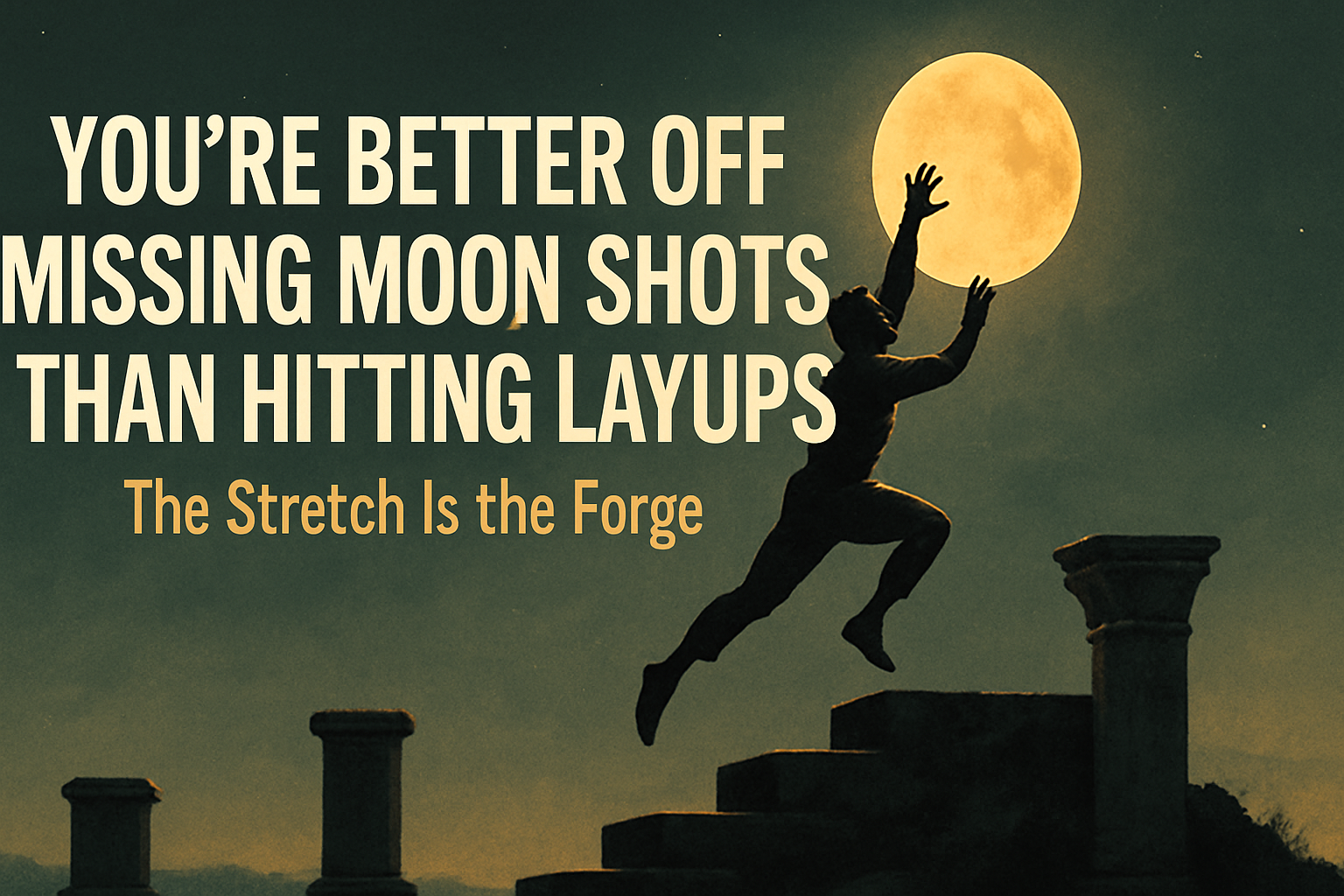
You're Better Off Missing Moon Shots Than Hitting Layups
By Derek Neighbors on November 13, 2025
Look at your goals this year. How many require you to become someone you’re not yet capable of being?
Not just work harder. Not just learn more. Actually transform into a different person with different capabilities.
If the answer is zero, you’re playing a game that keeps you exactly where you are.
You’re optimizing for a flawless record of comfortable achievement. And comfortable achievement is just expensive stagnation.
I watch talented people spend entire careers hitting every target they set. They build impressive resumes. Collect wins. Check boxes. And stay fundamentally the same person year after year.
Meanwhile, the people who transform set goals so audacious that missing them still means traveling further than most people dare to attempt.
Here’s what nobody tells you: The goals you know you can hit before you start don’t change you. The goals that force you to become someone you’re not yet capable of being, those are the ones that forge you.
You’re measuring success wrong. You think it’s about the win. It’s actually about what the attempt makes you become.
What Excellence Actually Demands
The ancient Greeks had a word for this: arete. We translate it as “excellence” or “virtue,” but it meant something deeper. It was about striving toward your highest potential, becoming the best version of what you’re capable of being.
Aristotle wrote that excellence is formed by action. But not just any action. The actions that forge you are the ones that require you to become more than you currently are.
Think about that. Excellence in the growth phase isn’t built by doing what you already know how to do. It’s built by attempting what forces you to become someone new.
Yes, mastery requires practicing what you’ve already learned. But growth requires attempting what you haven’t mastered yet.
This is where most people get stuck. They set goals they’re 80% sure they can achieve. They optimize for consistent wins. They build a track record of success.
And they plateau. Because the goals never required them to transform. The real fear shouldn’t be failure, it should be coasting.
If you’re only setting goals you’re confident you can hit before you start, you’re not optimizing for excellence. You’re avoiding transformation and calling it strategy.
And comfort doesn’t compound. Character does.
The Comfortable Goals Trap
Here’s what the safe goal path looks like:
You set objectives you’re confident about before you start. You stay within your current capabilities. You avoid the risk of public failure. You build a highlight reel of achievements.
It sounds smart. It looks successful. It’s actually the most expensive mistake you can make with your one life.
Because here’s what it costs you:
No forced growth. Your capability plateaus. Your character stays static. You become an expert at your current level, not the next one.
Marcus Aurelius wrote:
Waste no more time arguing what a good man should be. Be one.
Being one requires becoming one. And becoming requires attempting what you’re not yet capable of.
But we rationalize the safe path with wisdom-sounding excuses:
“I need to build credibility first.” “I’ll take bigger swings once I’m more established.” “Small consistent wins compound over time.” “I can’t afford to fail right now.”
These sound wise. They’re fear with a business card.
The 80% Victory Principle
Here’s a different approach: Set goals so ambitious that getting 80% of the way there requires total transformation.
Not goals you might miss. Goals where the miss is still more than you thought possible. Goals where attempting them forces capability development you wouldn’t get any other way.
Seneca understood this:
It is not because things are difficult that we do not dare; it is because we do not dare that they are difficult.
The difficulty is the point. The forge requires heat. Goals that don’t require you to transform don’t generate the heat needed for transformation.
Think about what this means practically:
If you achieve 80% of an ambitious goal, you’ve traveled further than if you’d hit 100% of a goal you were confident about from the start. Not just in results. In who you became during the attempt.
The stretch is the forge. And you need the forge more than you need the win.
How to Set Properly Scaled Goals
Here’s how you know if a goal is properly ambitious:
The Transformation Test: Would achieving this goal require you to become a fundamentally different person? If no, it’s not ambitious enough. If yes, you’re in the right territory.
The Fear Check: Are you scared to publicly commit to this? Fear is signal that the goal exceeds your current identity. That’s where growth lives.
The Capability Gap Question: List everything you’d need to learn and become to achieve this. If the list is short, scale up the goal. If the list makes you uncomfortable, you’re onto something.
The Character Forge Question: If you only get 70-80% of the way there, will you be proud of who you became? If yes, the goal is properly scaled. If no, you’re chasing achievement instead of transformation.
Look at what this produces:
Epictetus pursued philosophy as a slave. Shouldn’t have been possible. The attempt transformed him into one of history’s great teachers.
Building a company from zero to $10 million revenue in three years. Massive stretch. Even hitting $7 million requires becoming someone completely different than you started.
Writing a book that changes how an entire field thinks about a problem. High ambition. Even partial impact means creating something that matters.
These work because even falling short creates transformation. Getting halfway to impossible is still extraordinary.
And the person who attempts impossible develops capabilities the person chasing achievable never builds.
How You Know It’s Working
The markers show up in layers:
First 90 Days: You feel consistently uncomfortable. You’re learning at a pace that feels almost unsustainable. You’re making mistakes that teach you. Your old comfortable goals now seem small. Progress feels like nothing at this stage, but the compound curve is building beneath the surface.
Six Months: You’ve acquired capabilities you didn’t have at the start. Problems that seemed impossible now feel solvable. You’re thinking at a different scale. Your identity is shifting.
One Year: Even if you “missed” the goal, you’ve traveled further than you imagined. Your baseline capability is dramatically higher. You’ve become the kind of person who attempts big things. The “failure” taught you more than past “successes.”
Epictetus taught that we should focus on what’s in our control: effort, character, striving. Not what’s outside it: outcomes, recognition, achievement.
Are you becoming someone who dares greatly? That’s the real test.
Here’s the warning: If you’re hitting 100% of your targets, you’ve likely scaled down to what feels achievable. Your targets may be too small. You might need to double your ambition and attempt what genuinely requires transformation.
Because hitting all your targets often means you aimed for what felt safe.
What Changes When You Live This Way
The transformation isn’t subtle:
You become someone who dares. Fear of failure loses its grip. Your identity shifts to “person who attempts the impossible.” Goals that don’t require transformation feel like settling.
Your baseline capability keeps rising. What once seemed impossible becomes your starting point. You develop pattern recognition for solving hard problems. You build momentum that feeds on itself, and that capacity carries across everything you do.
Here’s the paradox: Once you stop optimizing for achievement and start optimizing for transformation, you often achieve more. Because you’re attempting things actually worth achieving.
The ancient philosophical concepts start operating in you:
arete, excellence, becomes your operating system. Not excellence as perfection, but as continuous striving toward potential.
eudaimonia, flourishing, comes from the striving itself, not from arriving. The stretch toward impossible is the flourishing.
You embody what Seneca wrote: “It is not that we have a short time to live, but that we waste a lot of it.”
Wasting it on safe goals is the greatest waste of all. Part of aiming higher is eliminating the comfortable distractions that keep you playing small.
This opens up a different kind of life:
Problems worth solving. Challenges worth attempting. A life spent becoming rather than maintaining. The kind of impact that only comes from attempting what seems impossible.
Aristotle was right:
We are what we repeatedly do. Excellence, then, is not an act, but a habit.
The habit of attempting moon shots, whether you hit them or not, is the habit that forges excellence.
The Choice in Front of You
Look at your current goals. Be honest with yourself: Are you stretching toward impossible or optimizing for probable? Are you setting goals that will transform you or just add to your resume?
Here’s the question worth sitting with: If you only got 80% of the way to your biggest goal, would you be proud of who you became in the attempt?
Because if the answer is no, you’re not aiming high enough. You’re playing it safe. And playing it safe means staying exactly who you are.
Set one goal this week that genuinely scares you. Make it so ambitious that missing it still means becoming someone extraordinary. Then start the work of becoming the person who dares.
The ancient Greeks understood something we’ve forgotten: Excellence isn’t about the trophy. It’s about the forge. And the forge only works when the heat is high enough to transform you.
You have a choice: Hit your layups and stay who you are. Or attempt your moon shots and become who you’re capable of being.
The safe path keeps you exactly where you are. The ambitious path forges you into someone worth becoming.
What’s it going to be?
Final Thoughts
The most dangerous part of comfortable success isn’t that it feels bad. It’s that it feels fine. You’re hitting your numbers. Checking your boxes. Building your resume.
And you’re staying exactly who you’ve always been. Excellence is rented, not owned, and comfortable targets never generate enough rent to matter.
Meanwhile, the person willing to publicly miss ambitious targets is being forged into someone unrecognizable from who they started as.
Same timeline. Completely different transformation.
If you’re ready to stop optimizing for achievement and start optimizing for transformation, MasteryLab.co exists for exactly this. A community committed to attempting impossible things and becoming extraordinary through the attempt. Daily accountability. Philosophical grounding. Practical frameworks for setting and pursuing goals that forge you.
Because attempting moon shots is harder alone. But it’s what separates a life of comfortable achievement from a life of meaningful transformation.
The choice is yours. But only one path builds the kind of person who does things that matter.



